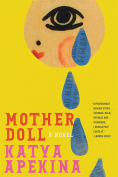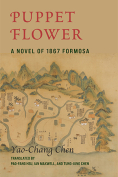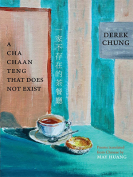The House of Doors by Tan Twan Eng
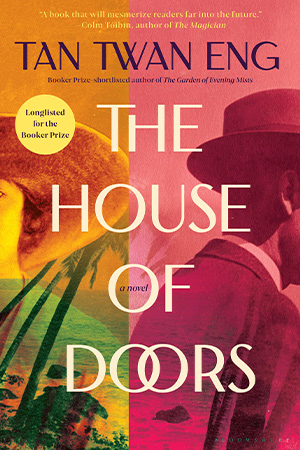 New York. Bloomsbury. 2023. 320 pages.
New York. Bloomsbury. 2023. 320 pages.
Tan Twan Eng’s third work of historical fiction gathers a cast of characters in 1920s Malaya: there is Lesley Hamlyn and her husband, Robert; Willie Somerset Maugham and his secretary, Gerald; Dr. Sun Yat Sen and the Chinese physician, Arthur. Titled The House of Doors, this novel is inspired by “The Letter,” a W. Somerset Maugham short story that fictionalizes the murder of tin-mine manager William Steward by Ethel Proudlock, his alleged lover, in British Malaya.
The House of Doors is at its heart a historical novel, but it is also a love story and a gorgeous meditation on the power of storytelling. This novel shows how stories can be used to entertain, certainly, but also how versions of a story can be used to manipulate and control people. Tan Twan Eng muses on the clichés of storytelling even as he slides under the skin of Maugham deftly in passages like this:
“I thought,” he said, laying out each word carefully in a clear precise line, “Thank God I don’t have to describe another pretty sunset ever again.”
House engages with the complex themes of colonial Penang at a time of great change and upheaval; the British Empire is in decline, and the local Malay and Chinese populations are increasingly asserting their rights. It is a time of great social and cultural ferment, when new ideas about race, gender, and sexuality are beginning to challenge the traditional order. Lesley may be a member of the ruling class, but as a woman she is unable to travel unchaperoned:
“I prefer to stay at the Empire.”
“By yourself?” He saw the set expression on my face. “All right, fine. If that’s what you want.”
Into Lesley’s world arrives William Somerset Maugham, the famous British writer, accompanied by his secretary and lover, Gerald Haxton. Maugham is a celebrated writer, but he is on the precipice of penury and needs to hide his financial situation from his young lover. Haxton, despite being wholly dependent on Maugham, is arrogant and self-serving. A friendship develops between Lesley and Maugham as secrets begin to surface, the rising tension bringing into focus the many kinds of love proscribed by society.
Tan weaves a braided and intricate plot, bringing his characters to life with prose that is lush and evocative. The House of Doors was longlisted for the Booker Prize in 2023, Tan’s third novel to be nominated for the Booker. Yet Tan has faced criticism for continuing to situate his stories in the past in a way that makes his novels irrelevant for the current Malaysian, because they do not engage with the sociopolitical issues of present-day Malaysia. In an article published in 2018, Susan Philips from the University of Malaya wrote:
This tendency to dwell on the past, perhaps as a means of coming to terms with the postcolonial, nationalist present, has been roundly rejected by Fixi Novo. Their manifesto (printed on the flyleaf of every volume of KL Noir) declares that they want to “publish stories about the urban reality of Malaysia. If you want to share your grandmother’s World War 2 stories, send ’em elsewhere and you might even win the Booker Prize”—this being a sarcastic allusion to the kind of work done by Tan Twan Eng and Tash Aw which, they imply, focuses on something that is too far in the past to really resonate with Malaysian readers.
As a writer who continues to engage with Malaysia in fiction, I found it especially remarkable how sexuality plays out as a major theme in The House of Doors and how relevant a statement it makes about LGBTQ+ rights in this modern multicultural nation. In the novel, Maugham and Haxton are lovers, but they have to keep their relationship a secret. Similarly, Robert’s infidelity is shrouded in secrecy, as even Lesley’s reaction to it is colored by the fact that homosexuality was illegal in colonial Penang.
In Malaysia today, more than a hundred years later, homosexuality is still illegal under section 377 of the Penal Code, which prohibits “carnal intercourse against the order of nature,” the wording unchanged from colonial times. The marginalization and oppression of LGBTQ+ people is not much different from the way Maugham and Haxton were constantly afraid of being discovered and arrested a century ago. Just as they had to hide their relationship from their friends and family, and were unable to live openly and authentically, in Malaysia today, LGBTQ+ people still face widespread discrimination and prejudice. The election of Anwar Ibrahim as the tenth prime minister of Malaysia had raised hopes for changes to LGBTQ+ laws in the Muslim-majority country, yet many passages from The House of Doors remain relevant today:
“You must have heard stories like that over the years. Yet you have never written about a homosexual affair in any of your books. You’ve never even alluded to it in all of your stories, not even once.” I looked at him. “And I think you never will. Why risk drawing the beam of that particular light onto yourself?”
His fingers tapped on the balustrade, reminding me of the flicking of an annoyed cat’s tail. All at once his fingers stopped moving. “And Arthur’s marriage? Do you have the right to destroy that?”
I unfurled a silky smile at him. “My dear Mr Maugham, surely you didn’t actually think I would have used his real name?”
Along with the third Booker nomination, this gorgeous book has garnered much praise from the media around the world. Tan is a consummate storyteller, despite the occasional overwritten passage, and one can only hope that this important novel will start some dialogues about LGBTQ+ rights in Malaysia.
Dipika Mukherjee
Chicago


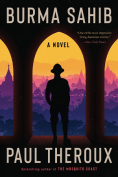
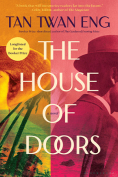
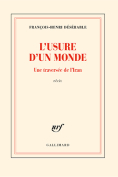






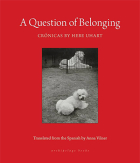
![The cover to [...] by Fady Joudah](/sites/worldliteraturetoday.org/files/styles/backissue_small/public/Joudah.jpg?itok=HZO1_68A)
